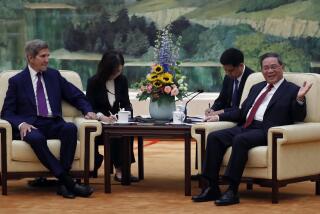Rice Advises Keeping an Eye on Beijing
- Share via
TOKYO — The United States needs strong strategic alliances in Asia with partners such as Japan to ensure that China chooses a peaceful path as it develops its economic muscle, Secretary of State Condoleezza Rice said today.
A day before a visit to Beijing, Rice told students and faculty members at Tokyo’s Sophia University that China’s rapidly growing economic clout could be either positive or negative. Washington’s responsibility is to “push, prod and persuade China toward a more positive course,” she said in response to a question from the audience.
In her prepared remarks, Rice also challenged the communist state to allow greater political freedom to match its economic liberalization.
“Even China must eventually embrace some form of open, genuinely representative government if it is to reap the benefits and meet the challenges of a globalizing world,” Rice said in her speech. “That is why we believe that when China’s leaders confront the need to align their political institutions with their increased economic openness, they will look around them and see that freedom works. They will see that democracy works.
“They will see that freedom of religion and respect for human rights are part of the foundation of decent and successful societies.”
Rice is touring Asia at a delicate time for Washington. Japan, its staunchest ally in the region, is enmeshed in territorial disputes with both China and South Korea that show the power of national pride in the region.
And Washington is trying to resolve its own internal tension between an impulse to confront China over its human rights record and the need to enlist Chinese support to curb North Korea’s nuclear weapons ambitions.
It is a difficult calibration. Rice’s pointed message to China on political freedom followed the release of a key political prisoner in China and an administration decision to drop a resolution critical of Beijing at the U.N. Commission on Human Rights. The State Department cited “significant steps” by China for its decision, including Beijing’s willingness to give political prisoners the right to parole.
The administration also has expressed its wish to see China take a firmer and more active role in those talks, and Rice cited China’s “particular opportunity and responsibility” on the North Korean question.
North Korea has declared that it will not discuss its nuclear weapons development until Rice retracts her recent description of it as an “outpost of tyranny.”
Although Rice avoided repeating the phrase in her Tokyo speech, she sharply criticized the conduct of the North Korean regime.
“The United States and other democratic societies will not be silent about the plight of the people of North Korea, about the nature of the North Korean regime ... and about the threat that a nuclear-armed North Korea poses to the entire region,” she said.
Rice has argued that U.S. and global security depends upon the spread of democratic values, whatever local or cultural form that takes.
As an example, she praised what she described as the “historic and inspiring” reemergence of Japan as a global actor after its long era as a bystander. Washington and Tokyo have strengthened their ties since the Sept. 11, 2001, attacks on the United States, with Japanese troops making a small but symbolic contribution to the American-led mission in Iraq.
“Japan has stepped up to wider global responsibilities,” Rice said, also noting the large deployment of Japanese military forces in this year’s tsunami relief. “We welcome that.”
Regarding Japan’s ban on American beef, Rice trod lightly. Japanese officials had warned Friday they were tired of American pressure to lift the ban, the one sore spot in their relationship.
Publicly at least, Rice merely told the Japanese that “American beef is safe,” and said the time had come to end wrangling over U.S. imports.
Instead, she praised the U.S.-Japan alliance as a model for the rest of Asia, and delivered Washington’s strongest endorsement yet of Japan’s pitch for a permanent seat on the U.N. Security Council. Washington “unambiguously supports” Tokyo’s aspirations, she said.
But any modification to Security Council membership would require the endorsement of China, which has veto power in the Security Council. Japan’s recent assertiveness in foreign relations and its willingness to send troops abroad is making its neighbors nervous.
More to Read
Sign up for Essential California
The most important California stories and recommendations in your inbox every morning.
You may occasionally receive promotional content from the Los Angeles Times.













